Sustainable tourism in Nepal is something I’ve become passionate about over the last couple of years. When I first started traveling, I didn’t know what sustainable tourism, responsible tourism, or social enterprises were. I didn’t think much about the impact my travels had on different places. I only thought about where I wanted to go, what I wanted to see, and whether or not it would make a great story. Now, I’m aware of the impact I have when I travel and I hope to educate my readers the way that other travelers have taken the time to educate me. I’m so thankful to those who have challenged the way I think and made me aware of so many small ways that I can make a difference while traveling. Here are a handful of easy ways you can be a more sustainable traveler.
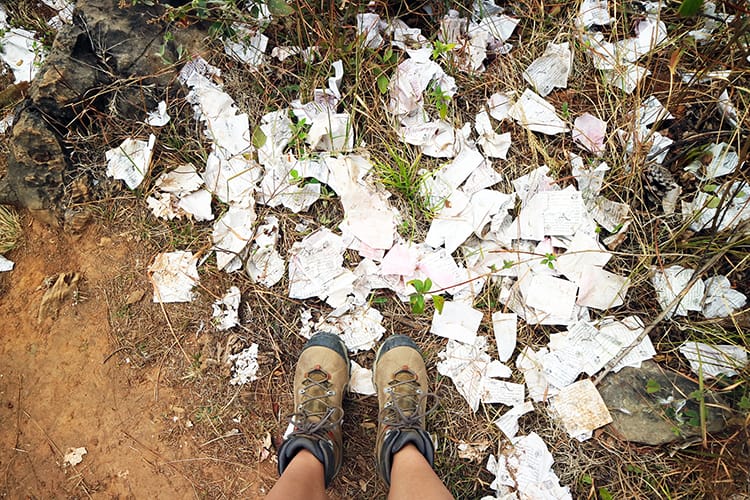
Say No to Animals Tourism
One of the easiest ways to help with sustainable tourism in Nepal is to say no to animal tourism. The biggest one in Nepal is elephant tourism. Every year, loads of people go to Chitwan National Park to take pictures riding elephants. There are a few organizations in Nepal that are trying to change that including SU4E and Tiger Tops. Check them out in order to have a positive experience with elephants that doesn’t involve torturing the animals.
Take Your Garbage with You
This one takes a little more effort, but I highly recommend taking a garbage bag on your treks. I used to think that throwing my garbage in a garbage pail made me a responsible traveler. On my third trek in Nepal, I saw an old man taking the garbage from his teahouse and throwing it in the beautiful river. Sadly, there is no garbage disposal in the mountains, and locals do whatever they can to get rid of garbage. Therefore, I ask you to please remove any garbage you bring with you by carrying it back down the mountain. A simple solution is not to purchase or bring things with packaging on your treks.
Don’t Demand a Fire
Trekking in Nepal often involves being freezing cold at night. Teahouses typically have one fire in the main dining area to keep people warm until they go to bed. Most teahouses don’t start the fire until 5 or 6pm. I’ve been to a lot of teahouses where people demand a fire early because they are cold. I get it. You’ve walked for hours and arrived at 1pm and have nothing to do but sit there. But, Nepal is one of the few countries in the world that has actually built up its forests instead of tearing them down. It’s something the country is proud of. By demanding fires, you’re demanding more firewood which means deforestation. It’s illegal to cut down trees in many areas. Keep in mind the limited resources when asking for a fire.
Avoid Single Use Plastic
This feels like common sense to me these days, but please choose an alternative to single use plastic. Something as simple as taking a reusable water bottle makes a huge difference. If you buy a water bottle, refill it each day and use chlorine tablets. Single use plastic is completely avoidable and unnecessary since there are tons of great eco-friendly travel products available these days.
Don’t Ask for Free Rooms
Asking for free rooms has become a well-known fact on certain trekking trails in Nepal. Backpackers encourage each other to ask for free rooms because why pay for something if you don’t have to? I’m the first to admit that I did this on the Annapurna Circuit. Since then, I’ve paid for every single room, no exceptions. And I feel super guilty that I behaved so poorly in the past. Rooms along trekking routes are $5 USD. If there are two people sharing, it’s $2.50 per person. If you do a 10-day trek with a shared room, it only costs $25 per person for hotels for the ENTIRE TREK. Yet, that’s a huge amount for the locals to be able to provide for their family. If you wouldn’t ask for a free room in your own country, why would you think it’s okay to ask for it in Nepal? This destroys the economy and makes it hard for locals to survive. It’s one of the least sustainable practices in Nepal, yet people who preach about sustainability ask for free rooms every day.
Don’t Demand Meat
Okay, I’m a terrible vegetarian. I’ve tried on and off for years and it’s hard for me to give up chicken and fish long term. I don’t judge people who eat meat. To each their own. But, there are certain circumstances where you shouldn’t demand meat. I have literally been to a vegetarian homestay where people put in “special requests” to be served chicken with dinner. I’ve also seen tourists demand it in highly religious areas that don’t believe in killing animals. It’s okay to eat meat if you want, but please be aware of your surroundings and don’t force people who are against it to serve you. If it’s not on the menu, there’s a reason.
Shop Local
Shopping local takes a little bit of extra time. Yes, you’ll have to research places to go or companies to support. Luckily, I’ve done some of the work for you. Check out my lists on social enterprises in Nepal and sustainable companies in Nepal. Supporting small locally owned businesses will give you unique souvenirs that will last longer than the cheap Chinese made versions that litter the streets of Thamel. There are so many amazing companies in Nepal that help support different causes. I highly recommend checking them out and spending your money where it’s used for good.
Book Local Tour Companies
There are tons of local tour companies in Nepal. It’s likely they don’t have a fancy website or maybe their grammar isn’t perfect. To be fair, neither is mine. But local companies offer something western companies don’t. They have insider knowledge on the most interesting places in Nepal, not just the most popular. Hiring a local company means you are helping local entrepreneurs, guides, teahouse owners, and more. If you’re going to visit a country, why not invest in its people rather than a foreign corporation?
Choose Homestays over Hotels
Staying in a homestay is such a unique experience. You get to live with a local family and see Nepali culture up close. Some homestays offer cooking classes, wood carving classes, and tours. This money all goes to support the local family rather than a chain. I guarantee you’ll have an amazing experience getting to know your host family. It’s like being a foreign exchange student as an adult.
Avoid Child Tourism
Yes, child tourism is a thing. In Nepal, child trafficking is still an issue. In Nepal’s recent history, there was a civil war and people took advantage of the situation by telling families they would take their children to safety in Kathmandu for a fee. They collected the money and then brought the children to Kathmandu. Many of these kids ended up in orphanages where tourists come and pay to volunteer. These kids are not orphans and there are a few organizations working hard to return them to their homes. Volunteering at these “orphanages” just fuels the problem by showing people that they can make money off the children. Likewise, you shouldn’t give money to children who beg. It’s tough to say no, but if adults can’t make money off kids, then they won’t have a reason for trafficking them.
Don’t Waste Food
In the US, we tend to waste food like it’s nothing. In Nepal, people work hard to grow food. Most families have experience working in agriculture and know how long it takes to grow rice, vegetables, etc. Therefore, they don’t take it for granted. Besides being respectful of locals and your hosts (who may have grown everything on your plate from scratch), it’s good for the environment. If the food on your plate wasn’t grown in the garden, it was likely brought by a giant truck spewing fumes. Less waste means less food, which means less trucks. Only put what you want on your plate and if you are served too much, give it back prior to touching it.
Learn About Cultures without Exploiting Them
In my travels, I’ve seen some interesting cultural phenomena resulting from tourism. For instance, the Long Neck Tribe in Thailand. They put metal rings around their necks as a form of protection from tigers. But, they don’t need to do this anymore. They continue to do it because tourists pay for photos of them. They are now a tourist attraction and they start adding rings to baby’s bodies when they are born so that they can make money when they grow up. I’m not one to judge and there is a lot of debate over whether it’s ethical to visit their village, but I do think it’s important to ask yourself if you are experiencing the culture or exploiting it. Are you interested in the culture, history, and religion? Or are you just there for an Instagram photo? Are you helping or hurting the society?
Give Back
I believe in leaving a place nicer than I found it, and the best way to be sustainable is to give back to the country. This could be something as small as picking up a few pieces of garbage on a trekking trail to volunteering for weeks to rebuild schools that are earthquake proof. Whatever it is, try to ask if there’s something you can do to help make Nepal a little bit better before leaving.
Have any suggestions on how to help with sustainable tourism in Nepal? Let me know in the comments. I’m far from perfect and am always looking to learn more about sustainability.
You might also like…
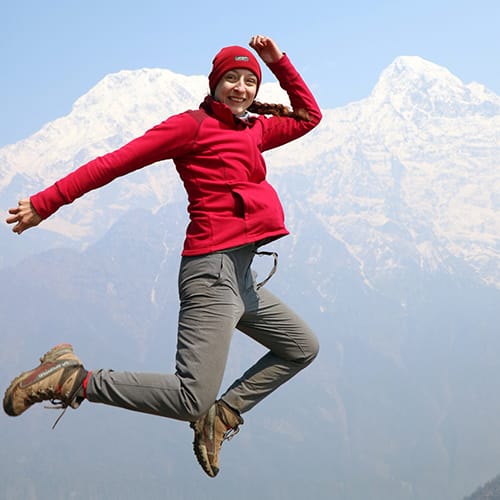
Michelle Della Giovanna
Writer at Full Time Explorer
I’m just your average New Yorker who quit her job in the fashion industry to explore the world. Come find out what it’s like to trade in five-inch heels for squat toilets.
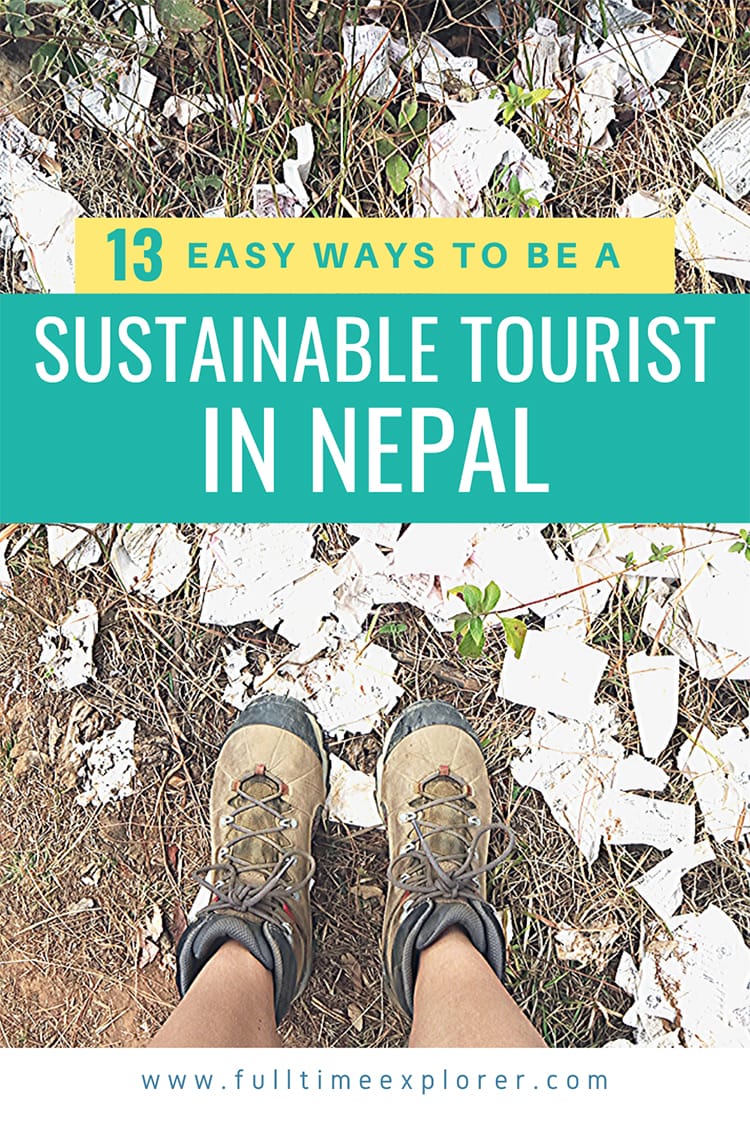
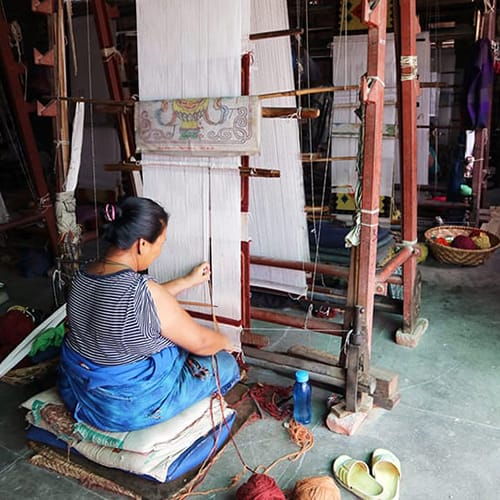

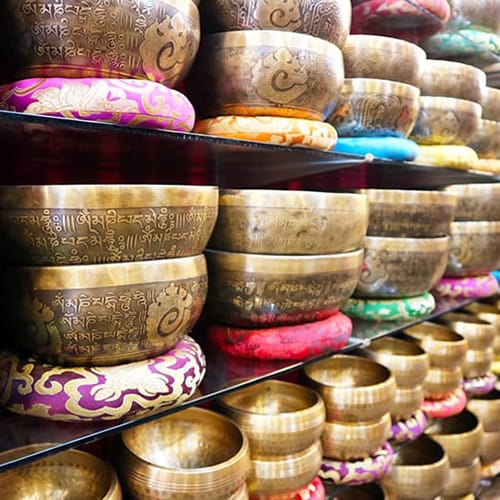
Leave a Reply